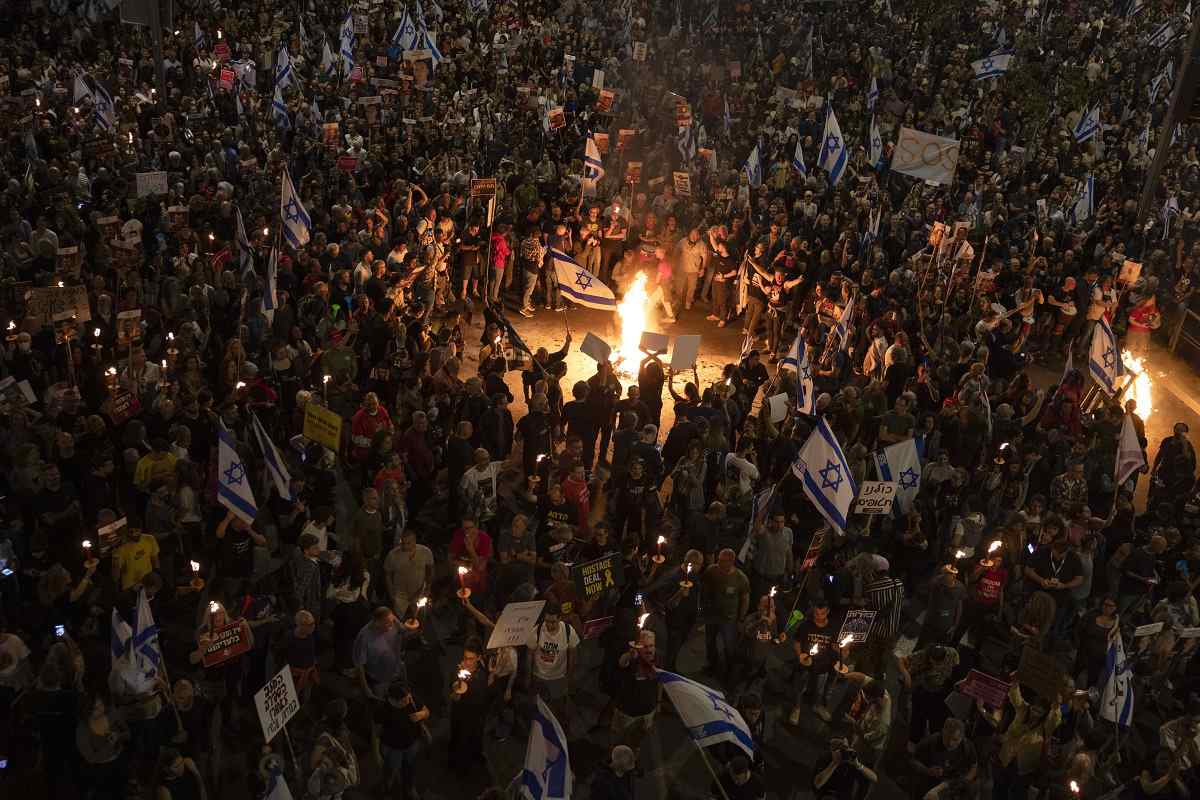
Thousands of demonstrators call for the release of hostages held in Gaza and against Israeli Prime Minister Benjamin Netanyahu and his government in Tel Aviv.
15:23 JST, April 1, 2024
TEL AVIV – Tens of thousands of demonstrators flooded Israel’s streets for a second straight night Sunday, calling for immediate elections and for the government to urgently negotiate the release of more than 100 hostages still held by Hamas in Gaza.
The twin demands represented a merging of two distinct protest movements – one including the families of hostages, the other led by civil society and the political opposition – which could become the greatest threat yet to Prime Minister Benjamin Netanyahu and his far-right government.
On Sunday, the protesters moved from “Hostage Square” plaza in Tel Aviv to the parliament in Jerusalem, waving Israeli flags and chanting for the removal of the country’s longest-serving leader. From inside the building, Netanyahu addressed his critics in a prime time address.
“The pain of the families of the hostages breaks my heart, I think it breaks all of our hearts,” he said. “Anyone who says that I’m not doing everything to bring back our hostages is wrong and is misleading others.”
“The calls for elections right now, at the height of the war, a moment before victory, will paralyze Israel for at least half a year,” he added. “And the first person to celebrate this will be Hamas.”
Outside the Knesset, Carmi Paltzi Katzir, whose brother Elad Katzir was dragged into Gaza from Kibbutz Nir Oz on Oct. 7, decried what she said was the “failure of the government.”
“I would have never believed that after six months I would need to fight with the government for my brother’s right to return alive, or to return at all,” she said.
She cited testimonies from released hostages indicating that her brother, at least at first, had been to able to listen to the radio and watch television in captivity: “What does he think about us, as a society, about our prime minister?” she wondered.
The event on Sunday was the start of a four-day rally that organizers hope will either force the government to jump-start hostage negotiations – or lead to the collapse of Netanyahu’s coalition, the most right-wing in the country’s history.
Netanyahu is already under growing pressure from Washington, Israel’s most important weapons supplier and diplomatic backer. American officials have expressed growing alarm about the war in Gaza, including Israel’s planned offensive in the southern city of Rafah, home to 1.4 million displaced Palestinians, and the humanitarian crisis in the north, where Israeli restrictions on aid deliveries have put hundreds of thousands of people on the brink of starvation.
Senate Majority Leader Charles E. Schumer (D-N.Y.) warned this month that Israel risked becoming an international “pariah” under Netanyahu’s leadership and urged the country to hold new elections. Netanyahu had been largely insulated from external pressure by an Israeli public that overwhelmingly supported the war and – until now, at least – had no appetite for wartime elections.
But the tide could be shifting.
On Saturday in Tel Aviv, Einav Zangauker, whose 24-year-old son Matan is held in Gaza, blamed the prime minister for “torpedoing” a deal for a temporary cease-fire that would have allowed Israeli hostages to be exchanged for Palestinian prisoners.
“You stand between us and bringing our loved ones home,” she said, addressing Netanyahu.
Saturday’s mass street demonstrations in Tel Aviv, Jerusalem and several other cities, was led by the Hostage Families Forum, an umbrella organization for the relatives of hostages.
Since the beginning of the war, the families have been told by the government that only military pressure would bring their loved ones home. They refrained from issuing political statements, instead sharing testimonies from former captives and offering condolences as hostage death notifications trickled in.
Nearly six months after Oct. 7, many families have received no official information about their relatives held in Gaza. Some have had requests to meet with Netanyahu and the war cabinet denied. Many say their trust in the government has evaporated.
“The families of the hostages have reached a breaking point with Netanyahu,” said Josh Drill, a leader of a group called Change Generation, which since Oct. 7 has called for the release of the hostages and a new Israeli government.
The decision by some families to join the anti-government movement is “not inherently political,” he said. “They are simply doing all they can to get their loved ones home and they now recognize that Netanyahu is an obstacle to that.”
Several hostage families joined a more general anti-government protest as it blocked Tel Aviv’s main highway Saturday night. They lit bonfires in the street and were among 16 people arrested as police unleashed water cannons on the crowds. On Sunday night, demonstrators again clashed with police as they blocked main roads in Tel Aviv and Jerusalem.
The scenes were reminiscent of the tumultuous months that preceded Oct. 7, in which hundreds of thousands of Israelis protested a government campaign to weaken the judicial system.
Now, protesters say, the stakes are even higher.
“Our country is being led by a gang of nut cases that jeopardize not only our existence but our well being,” said Shaul Dwek, 70, who joined the crowds in Jerusalem on Sunday with his wife, Netta. “This is not the way we grew up and these are not the values that we hold.”
Gili Amar, a 29-year-old musician, wanted more “clarity about what [the decision-makers] are doing, what the objectives are.”
On Sunday, Israel sent a low-level delegation to Cairo to resume indirect truce talks with Hamas. If the negotiations progress, the heads of Mossad, Israel’s national intelligence agency, and Shin Bet, Israel’s internal security service, will join them, according to an Israeli official who spoke on the condition of anonymity to discuss the ongoing negotiations.
But families have seen round after round of talks fail. They fear that time has already run out.
“[The hostages] will not hold out there, no one can survive what they are going through there,” said Raz Ben Ami, who was released during a temporary cease-fire in late November, at the Saturday night rally in Tel Aviv.
“Prime Minister, on behalf of the hostage men and women, on behalf of the people of Israel, give the negotiators in Qatar the order: ‘Do not return without a deal.’”
Nearly every week now, there are new testimonies from former hostages about the abuse they endured at the hands of their captors – and the fears they have for those still inside.
Liri Albag, 19, who has been kept in subterranean tunnels and in private homes, according to testimonies passed on to the Albag family from released hostages, was forced to cook and clean for those keeping her.
“The hostages had to prepare food, but they themselves could not eat,” Shira Albag, Liri’s mother, told Israel’s public broadcaster last week.
Aviva Siegel was among the first of the released hostages to testify to sexual assault in captivity, telling a Knesset hearing in January that the captors dressed the hostages as “dolls,” watched them shower, and subjected both women and men to sexual and physical abuse.
On Saturday, she said the government needed to stop treating hostage negotiations “as a children’s game.”
“Do you hear me Bibi?” she said, using Netanyahu’s nickname. “Stop talking about victory, stop talking about military pressure. Nothing will work. Nothing has worked until now. They’re dying there, every day.”
"News Services" POPULAR ARTICLE
-

American Playwright Jeremy O. Harris Arrested in Japan on Alleged Drug Smuggling
-

Japan’s Nikkei Stock Average as JGB Yields, Yen Rise on Rate-Hike Bets
-

Japan’s Nikkei Stock Average Licks Wounds after Selloff Sparked by BOJ Hike Bets (UPDATE 1)
-

Japan’s Nikkei Stock Average Buoyed by Stable Yen; SoftBank’s Slide Caps Gains (UPDATE 1)
-

Japanese Bond Yields Zoom, Stocks Slide as Rate Hike Looms
JN ACCESS RANKING
-

Keidanren Chairman Yoshinobu Tsutsui Visits Kashiwazaki-Kariwa Nuclear Power Plant; Inspects New Emergency Safety System
-

Imports of Rare Earths from China Facing Delays, May Be Caused by Deterioration of Japan-China Relations
-

University of Tokyo Professor Discusses Japanese Economic Security in Interview Ahead of Forum
-

Japan Pulls out of Vietnam Nuclear Project, Complicating Hanoi’s Power Plans
-

Govt Aims to Expand NISA Program Lineup, Abolish Age Restriction



















